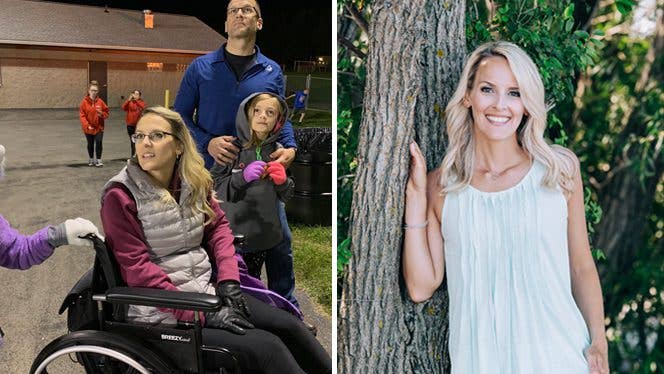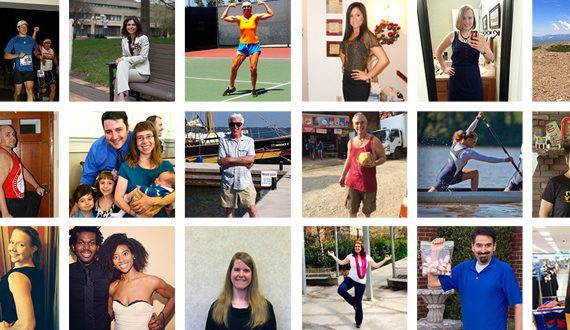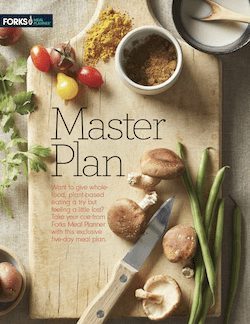
I Switched to a Plant-Based Diet and Resolved My Chronic Pain, MS Symptoms, and Kidney Disease
By Kimberly Eallonardo,
As a child, I had a lot of odd symptoms and ailments—tics, shingles, and intractable migraines. From the time I was 12 years old, I was on some sort of medication or steroid for the migraines, but nothing seemed to work. They progressively got worse.
Still, I managed to design a wonderful life for myself. I built a career, met a great man, and started a beautiful family. But shortly after the birth of our third daughter, a level of fatigue and weakness set in that I had never experienced before. I began to have bouts of severe joint pain, mysterious rashes, gastrointestinal upset, sleeplessness, and migraines so bad that I made several trips to the ER.
It didn’t make sense. I was physically active, and I’d always eaten what I thought was a healthy diet. My typical breakfast was a protein smoothie, or eggs with avocado and tomato. I snacked on Greek yogurt and protein bars. Sometimes I’d eat sandwiches with “healthier” deli meats, like turkey. I ate a lot of whole foods at lunch and dinner, though I always had a lot of protein and fat at each meal.
With my symptoms worsening, I went to see a doctor, who told me it was low iron. But each symptom intensified, even after taking iron supplements.
8 Years of Searching
Over the course of eight years, I ping-ponged from specialist to specialist. Each doctor would give up on trying to find a solution and refer me out to another specialist. I received diagnosis after diagnosis: Raynaud’s syndrome, lupus, rheumatoid arthritis, and hypoactive thyroid.
After a brain scan and spinal tap, I was diagnosed with multiple sclerosis, which eventually put me in a wheelchair. I gained 40 pounds and lost vision in one eye. I had to undergo surgery for a large tumor that had coiled itself around the peroneal nerve in my left leg, and I subsequently developed complex regional pain syndrome.
I was the perfect patient: I followed all of the doctor’s orders, went to every appointment, and took every medication and supplement. I tried every fad diet I could think of, from paleo to keto, from high-fat to fasting. Still, my symptoms only became more crippling. The chronic fatigue I was trying to alleviate was compounded by the fatigue of searching for answers.
I was forced to redesign my life around feeling unwell. The worst of it all was that I was missing milestones in my children’s lives. I couldn’t give them what I saw other children being given. In agony, I watched from the couch as they grew up. It was gut-wrenching.
Another Startling Diagnosis Sparks Change
In November 2019, my husband called my primary care doctor and said, “Enough is enough. My wife can barely move and now it’s hard for her to breathe.” My doctor told my husband to take me to the hospital. It turned out I had pleurisy in my lungs, and a dangerous blood clot in my leg. Over the next couple days they ran more tests and found that I had advanced kidney disease. The nephrologist said I’d likely need a transplant in six months.
That’s when I finally said, “Enough is enough.” I knew that I needed to truly heal, not just suppress my symptoms. Two weeks later, I was discharged from the hospital, determined to put my health first—mind, body, and soul—and allow my body to do what it was designed to do.
When my neighbor, who also had CKD, shared with me The China Study and Forks Over Knives, I was immediately ready to try a whole-food, plant-based diet. For me, it was a matter of life and death. I made the switch overnight, cutting out animal products, oil, and highly processed foods.
It wasn’t easy, but I had a mama-bear mentality that helped me stay the course: I needed to be there to take care of my children. Another thing that really helped me in the first few weeks was understanding the biochemical processes that were causing my cravings for the foods I used to eat. And thank goodness for my husband! He kept me on board when I was too sick to shop and prepare meals.
Remission and Recovery
Within six weeks of going WFPB, I experienced what my nephrologist called a spontaneous remission. Some would call it a miraculous recovery. I had set out trying to avoid a kidney transplant and end-stage renal failure: I not only succeeded in restoring my kidney functioning; I also resolved virtually all the other symptoms that had been plaguing me for years. My MS no longer bothered me. The blood clot in my leg had dissolved. My migraines were gone. My joint pain receded. My energy came back. Lab work showed that my numbers were normal, as though nothing had ever been wrong. I was blown away by how quickly my body healed, as were my nephrologist, hematologist, and rheumatologist.
In remission, I was out of my wheelchair, playing with my kids, and taking care of the house again. That’s when I started to “cheat” more—eating non-WFPB foods, not sleeping enough, and reverting to some other unhealthy habits—and I had a flare-up with my MS. After that, I started to teach myself about the process of sustainable change. I realized that when I gave into temptation and ate unhealthy foods, I received instant gratification but denied myself things so much greater than the cookie in front of me: quality life with my children, riding my bike, going to the beach, date nights with my husband, to name just a few. I recommitted to eating whole-food, plant-based.
Helping Others Heal
Today I remain wheelchair-free. I play with my children, make it to their activities, and have the stamina to home-school. I am even back to work!
In light of my own profound recovery, I also switched my daughter to a WFPB diet. Suffering from severe eczema since birth, and diagnosed with chronic migraines at age 4, she had spent most of her days bedridden or getting IVIG infusions. She had so much pain and sensitivity that we couldn’t even hug her. Today, at age 12, she is back to gymnastics and sharing her vibrant personality. She actually craves whole foods and prefers them over processed foods now.
The great part is that this lifestyle doesn’t feel hard anymore. It’s just a normal part of our day-to-day lives. We usually make “mish-mash bowls,” which have a base of potatoes or brown rice, with a variety of beans and veggies. Then we tie everything together with a homemade oil-free dressing or sauce or hummus. My husband and I really like simple veggie soups in the winter (still working on getting my kids to like them). We don’t have a lot of time to cook (I know, no one does—but we really don't) so we also do super easy meals, such as seasoned roasted potato wedges with a side of veggies and some fruit. Nothing fancy, but it's practical and tastes good!
Since my recovery, I have made it my life’s mission to help other people who are chronically ill and desperate to heal. It’s a soul-sucking feeling when you realize that symptoms have stealthily snuck in and all of sudden you are living a new normal that you never intended. No one should have to experience this, which is why I became a certified health coach helping women with chronic kidney disease and autoimmune disease.
It was one hell of ride to get here, and my family lost a lot in those eight years when I was seriously ill. I will be forever grateful to my neighbors, who opened my eyes to a whole-food, plant-based lifestyle. It’s a liberating feeling to know that we have control of our health.
Ready to get started? Check out Forks Meal Planner, FOK’s easy weekly meal-planning tool to keep you on a healthy plant-based path. To learn more about a whole-food, plant-based diet, visit our Plant-Based Primer.

Has a whole-food, plant-based diet impacted your life?
We would love to hear about it!
SHARE YOUR STORY
Free Download
Free 5-day meal plan!
Get a taste for healthy, fuss-free meal planning with this free five-day meal plan from Forks Meal Planner!
By providing your email address, you consent to receive newsletter emails from Forks Over Knives. We value your privacy and will keep your email address safe. You may unsubscribe from our emails at any time.

Join our mailing list
Get free recipes and the latest info on living a happy, healthy plant-based lifestyle.
By providing your email address, you consent to receive newsletter emails from Forks Over Knives. We value your privacy and will keep your email address safe. You may unsubscribe from our emails at any time.